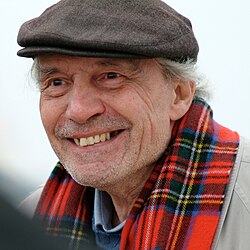
Jacques Rivette (French: [ʒak ʁivɛt]; 1 March 1928 – 29 January 2016) was a French film director, screenwriter and film critic. He wrote and directed twenty feature films, including the two-part Joan the Maiden, eight short films and a three-part television documentary. He also acted in small roles and participated in documentaries.[1] After making his first short film, Aux quatre coins, in his hometown of Rouen,[2] Rivette moved to Paris in 1949 to pursue a career in filmmaking.[3] While attending film screenings at Henri Langlois' Cinémathèque Française and other ciné-clubs he gradually befriended many future members of the French New Wave, including François Truffaut, Jean-Luc Godard, Éric Rohmer and Claude Chabrol.[4] Rivette's association with this group of young cinephiles led to the start of both his filmmaking career and his work in film criticism. In collaboration with his new friends, Rivette made two more short films and worked as a cinematographer and editor on films by Rohmer and Truffaut.[5][6][7] He also worked in small roles and as an assistant director to Jean Renoir on French Cancan and Jacques Becker on Ali Baba and the Forty Thieves.[8][9][10] During this period he began writing film criticism for the magazine Gazette du Cinéma and later Cahiers du Cinéma,[3][11] and was one of the most respected writers by his peers.[12]
In 1956 Rivette made the short film Le Coup du Berger, which Truffaut credited as enacting the New Wave movement.[13] The following year he began work on his first feature film with the initial support of Italian neorealist director Roberto Rossellini.[14] Paris Belongs to Us was shot in the summer of 1958,[15] but not released theatrically until 1961,[13] after Chabrol, Truffaut and Godard had their feature-film debuts distributed and made the New Wave renowned worldwide.[16] After staging a theatrical version of Denis Diderot's novel La Religieuse starring Anna Karina in 1963,[17] Rivette became the editor-in-chief of Cahiers du Cinéma until 1965.[18] He then began production on a film version of La Religieuse, which led to a lengthy public battle with French censorship over the film's release.[19] Finally released in 1967, the publicity made it financially successful.[16]
Rivette was unhappy with La Religieuse and re-evaluated his career, developing a unique cinematic style with L'Amour fou.[16] Influenced by the political turmoil of May 1968, improvisational theater and an in-depth interview with Jean Renoir,[20] Rivette began working with large groups of actors on character development and allowing events to unfold on camera. This technique led to the thirteen-hour Out 1.[16] His films of the 1970s, such as Celine and Julie Go Boating, often incorporated fantasy and were better-regarded. After attempting to make four consecutive films, however, Rivette had a nervous breakdown and his career slowed for several years, with films such as Merry-Go-Round and Le Pont du Nord being difficult productions.[21][22][23]
During the early 1980s, he began a business partnership with producer Martine Marignac, who produced all his subsequent films.[24] Rivette's output increased from then on, with films such as Gang of Four and La Belle Noiseuse receiving international praise.[25][26] He continued making films until 2009,[27] retiring after the early symptoms of Alzheimer's disease made the production of 36 vues du pic Saint-Loup too difficult for him to continue.[27] Many of his films are known for their long running time, including the 760-minute Out 1. Almost always at the insistence of the distributors, Rivette edited shorter versions of five of his films and considered some of them to be entirely new films with different meanings.[1]
- ^ a b Wiles 2012, pp. 151–162.
- ^ Baecque 2010, p. 55.
- ^ a b Baecque 2010, p. 39.
- ^ Baecque 2010, p. 37.
- ^ Monaco 1976, p. 313.
- ^ Wiles 2012, p. 2.
- ^ Wiles 2012, p. 3.
- ^ "Jacques Rivette". AlloCiné. Archived from the original on 10 March 2016. Retrieved 25 January 2017.
- ^ "Le Château de verre". UniFrance. Archived from the original on 1 January 2023. Retrieved 25 October 2016.
- ^ "BFI | Film & TV Database | Rivette, Jacques". British Film Institute. Archived from the original on 5 February 2016. Retrieved 25 October 2016.
- ^ Baecque 2010, p. 52.
- ^ Baecque & Toubiana 1999, p. 49.
- ^ a b Baecque & Toubiana 1999, p. 150.
- ^ Gallagher 1998, p. 458.
- ^ Truffaut 1994, p. 320.
- ^ a b c d Wakeman 1988, pp. 895–902.
- ^ Wiles 2012, p. 162.
- ^ Brody 2008, p. 207.
- ^ Wiles 2012, p. 24.
- ^ Wiles 2012, p. 41.
- ^ Wiles 2012, p. 63.
- ^ Wiles 2012, pp. 143–144.
- ^ Wiles 2012, p. 74.
- ^ Wiles 2012, p. 146.
- ^ Wiles 2012, p. 115.
- ^ Austerlitz, Saul (January 2003). "Jacques Rivette – Great Director profile". Senses of Cinema. Archived from the original on 4 June 2023. Retrieved 15 March 2016.
- ^ a b Tonet, Aureliano; Nouchi, Franck; Mandelbaum, Jacques; Sotinel, Thomas; Fabre, Clarisse (30 January 2016). "Pour Rivette, les films étaient constitués comme des complots". Le Monde (in French). Archived from the original on 27 August 2022. Retrieved 4 February 2016.